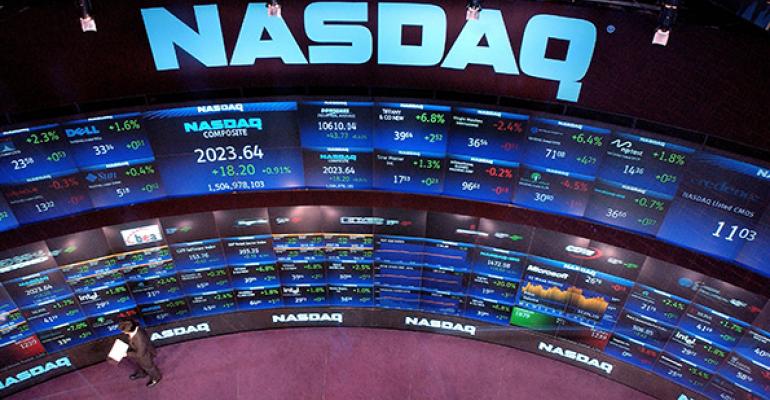(Bloomberg) -- A year after the Nasdaq 100 Index last closed at an all-time high, there’s no sign the index is heading back to those heights any time soon.
The 249 trading sessions since the close on Nov. 19, 2021, is the tech-heavy benchmark’s longest stretch since the dot-com era, and the third-longest ever: It took the gauge 3,925 trading days -- more than 15 years -- to recover from the dot-com crash and 416 sessions to rebound from the Crash of 1987.
This bear market in tech stocks is shaping up to be the longest that many young investors have ever seen, and may curb their appetite for risk for years to come. Even after a bounce this month, the Nasdaq 100 is still down 29% from its record close.
“Big tech still has secular growth drivers, but the growth will be lower, which means they’ll have valuations under the levels they had when times were good,” said Anthony Saglimbene, chief market strategist at Ameriprise Financial. “That could mean, from a sentiment perspective, that there will be some reservation about jumping back in.”
Investors’ risk appetite got a shock this year when inflation raged out of control, prompting the Federal Reserve to begin its most aggressive campaign of interest rate increases since the early 1980s. Multiple routs ensued as investors fled the high-growth, high-valuation stocks that had prospered in the era of near-zero global interest rates.
Among US benchmarks, the Nasdaq 100, which was created in 1985 by the National Association of Securities Dealers, has taken the brunt of the selling. Technology companies account for half of its value. Add in some companies that are classified as parts of other sectors, like Google parent Alphabet Inc. and Amazon.com Inc., and the weighting jumps above 60%.
Now, 11 members are down 50% or more this year, compared to just two stocks in the same period last year. The selloff has wiped $5.7 trillion off the benchmark’s market value, and lowered its valuation to 21 times projected earnings from 29 a year ago.
A report a week ago of cooler-than-expected inflation triggered the steepest rally in more than two years, giving new vigor to battered stocks like Meta Platforms Inc. and DocuSign Inc. Still, one central bank governor said the Fed has a “ways to go” before it pauses its cycle of interest rate increases, and plenty of economists expect a recession that will hammer corporate earnings in the coming months.
“Things have gotten less bad, which is good, but that isn’t enough to give me confidence that valuations are at the bottom,” said Jordan Stuart, client portfolio manager at Federated Hermes.
Investors are still fleeing the sector: Bank of America Corp.’s latest survey highlighted that fund managers are the most underweight technology they’ve been since August 2006. Traders of exchange-traded funds are placing a record wager against the big comeback in tech stocks, according to data compiled by Bloomberg.
“The risk appetite today isn’t there, but it will come,” said Sylvia Jablonski, CEO and CIO of Defiance ETFs. Portfolios in coming years will be more diversified. “A few years ago, it would have been fine to pick the FAANGs, set it and forget it. That has changed, the process is more thoughtful.”
Tech Chart of the Day
Apple Inc. has embarked on the most aggressive share buyback program on Wall Street in recent years. The iPhone maker, which typically tops up its share repurchase authorization after its fiscal second quarter ends in March, has expanded its program by at least $50 billion every year since 2019. Apple spent almost $90 billion last year -- equal to about the market value of Citigroup Inc. -- and $32 billion more than the next highest company, according to Bloomberg data.
Top Tech Stories
- Alibaba Group Holding Ltd. reported revenue for the second quarter that missed the average analyst estimate and it posted a surprise loss. The Chinese e-commerce powerhouse also raised its share buyback by $15 billion. The shares fell in US premarket trading.
- Nvidia Corp. assured investors Wednesday that demand remains strong for its artificial-intelligence and data-center chips, even as the company struggles with a slowdown in the personal-computer market.
- NetEase Inc. and Blizzard Entertainment Inc. plan to end their 14-year partnership after January, depriving the Chinese firm of a slice of revenue and suspending service for some of the country’s most popular games.
- Elon Musk will be creating room for competitors of Twitter Inc. to emerge if he breaks the “ethos” of the influential social media company, former Chairman Patrick Pichette said.
- Tencent Holdings Ltd.’s plan to dole out $20 billion of stock in meal delivery giant Meituan triggered a broad selloff of Chinese internet stocks on Thursday as investors fear more divestments by the online gaming company are in the offing.
- Taiwan expanded tax breaks for companies that invest in technology research and production in an attempt to strengthen the island’s semiconductor industry and help maintain its leading position in the global chip supply chain.
- Shares of One 97 Communications Ltd., the parent of India’s leading digital payments brand Paytm, plunged in Mumbai as a unit of Japan’s SoftBank Group Corp. lowered its stake in the company.
- Grab Holdings Ltd. reported a narrower third-quarter loss than analysts had estimated, helped by cost cuts by the Southeast Asian ride-hailing and delivery giant.
--With assistance from Matt Turner and Tom Contiliano.





